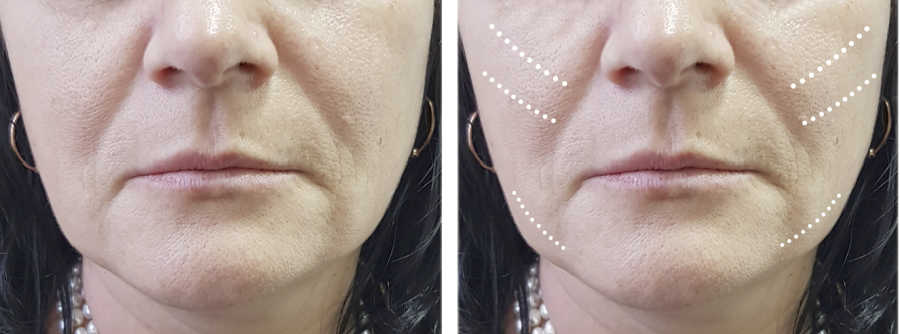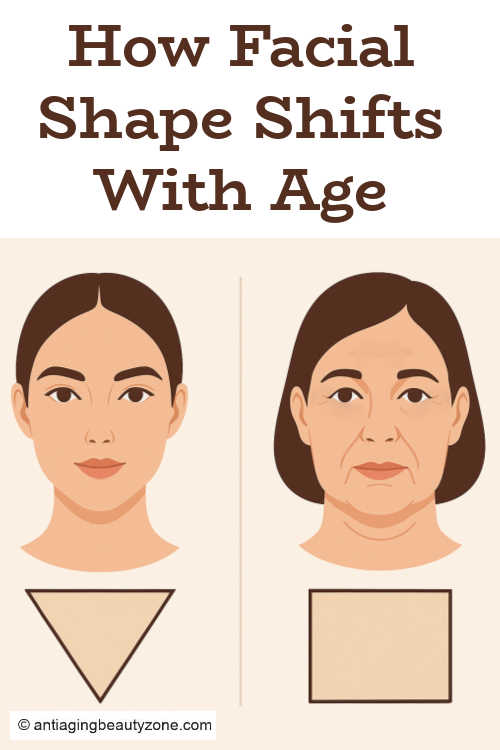Two Simple Facial Jowl Exercises That Work!
Learn two simple jowl exercises for a firmer, more defined jawline—no surgery or gadgets required.
This page is part of my Jowl Lift Without Surgery hub, so if that’s where you started, you’re in the right place.
These moves take less than 2 minutes and can also give your cheeks a nice lift.

What are jowls / causes
 What causes facial jowls in first place?
What causes facial jowls in first place?Jowls are the sagging skin that shows up along the jawline with age. Skin loses bounce, fat pads shift, and support changes underneath.
I explain all the causes in detail in my Jowl Lift Without Surgery guide—here, we’ll focus on how exercises may help the area look firmer.

Why exercises work
Why do face and jowl exercises work? Because they address many of the issues that cause facial aging and contribute to a sagging face.
- Skin: The exercises massage the skin, stimulating collagen, improving elasticity, texture, and firmness.
- Muscles: Stronger muscles support skin and structures for a more lifted appearance.
- Fat Pads: Firmer muscles may help fat pads stay closer to their natural position.
Before and after pictures
My before-and-after photos below show my personal results after 10+ years of consistent facial exercise. At age 63, my jawline looks firmer than it did in my early 50s.
Results vary, but this is what worked for me.
 The after picture was taken over 10 years later. My Jowls and jawline are firmer, cheeks are more defined and the neck is firmer. In my opinion, facial/jowl exercises do work.
The after picture was taken over 10 years later. My Jowls and jawline are firmer, cheeks are more defined and the neck is firmer. In my opinion, facial/jowl exercises do work.Here’s a snapshot of my own results. For my first 6-month progress diary and my long-term update, see my Jowl Before & After photos.
Exercise 1: Jawline Glide
Place both thumbs under your chin and glide slowly along the jawline toward your ears. Repeat 3–5 times with light pressure.
This helps encourage fluid movement and definition.
Here is how it works:
1. The first step helps firm-up the malaris muscle. This superficial and delicate facial muscle is located near the outer corner of the eyes.
While it is not as well-known as other facial muscles, it does exist in some individuals, particularly in certain ethnic groups like Asians.
Studies suggests that the malaris muscle could play a role in lifting and supporting the mid-face area. This could contribute to a more youthful appearance and a less saggy jawline.
2. The second step involves shaping the cheek muscles.
3. The last step, massage and firm-up the skin in the mid-face area.
Exercise 2: Mouth-Corner Lift
Make a soft “O” with your mouth. Place your index fingers at the corners of your mouth and lift gently toward your cheekbones. Hold for 3 seconds, release, and repeat 5 times.
These moves take less than 2 minutes. For a full guided routine, see my Jowl Lift Without Surgery hub.
FAQ: Jowl exericses
Question: Do jowl exercises really work?
Question: Do jowl exercises really work?
Answer: Yes, jowl exercises can help improve the look of a sagging jawline when practiced consistently. Results vary from person to person, but many notice a firmer, more defined lower face over time.
Question: What is the best exercise for sagging jowls?
Question: What is the best exercise for sagging jowls?
Answer: The two I recommend starting with are the Jawline Glide and the Mouth-Corner Lift. They’re simple, effective, and only take a couple of minutes a day. But a full face workout is important for best results.
Question: Can exercises reduce or get rid of jowls?
Question: Can exercises reduce or get rid of jowls?
Answer: Exercises won’t completely erase jowls, but they can reduce their appearance by improving muscle tone and circulation. Think of them as a natural way to support a tighter, healthier-looking jawline.
Question: How can I tighten jowls naturally at home?
Question: How can I tighten jowls naturally at home?
Answer: Regular facial exercises, hydration, good skincare, and gentle massage all work together to tighten the look of jowls naturally—without surgery or gadgets.
Question: Can facial exercises prevent jowls?
Question: Can facial exercises prevent jowls?
Answer: Doing jowl exercises regularly may help delay or prevent early sagging by keeping the muscles around the jawline active and toned.
Why try jowl exercises?
Facial exercises may help your jawline look a little firmer and less heavy by working on three things at once:
- Muscles: Strengthens support in the lower face so skin sits on a firmer base.
- Circulation: Brings fresh blood flow for a healthier glow.
- Skin & Fat Pads: Gentle movement may encourage smoother skin texture and help underlying fat pads stay in a better position.
📸 My own proof: See my before-and-after photos below—taken 10 years apart. Results vary, but with steady practice, I’ve kept my jawline firmer even as I’ve aged.
What research says
Studies are still small, but encouraging:
- A 2018 Journal of Cosmetic Dermatology study found facial exercises improved appearance in middle-aged women.
- A 2018 review suggested they may help reposition sagging fat pads.
- Other research notes that stronger facial muscles and ligaments could help resist drooping over time.
👉 Bottom line: exercises aren’t a replacement for surgery, but they’re a safe, natural way to support a firmer-looking jawline—especially if you stay consistent.
Expert opinions
Gary Sikorski of Happy Face Yoga, a leading proponent of facial yoga exercises, believes it can help tone the muscles and reduce the appearance of sagging skin. "Facial exercises are a great way to improve the appearance of your face naturally," he says.
And, Dr. Murad Alam, a professor of dermatology at Northwestern University Feinberg School of Medicine, acknowledges the potential benefits. "While more research is needed, facial exercises may help tone the face muscles and improve the appearance of your face," he says.
Final takeaway: Facial jowl exercises
These two simple jowl exercises are a great place to start if you want a firmer-looking jawline at home.
Want to go further?
These two jowl exercises are a great start—but you’ll see the best results when you support your whole face and neck.
- Firm Your Sagging Face Naturally – My full guide to facial exercises, skincare tips, and before-and-afters.
- Fuller Cheeks Without Fillers – How I lifted my mid-face naturally and brought back definition.
- Turkey Neck Rescue – The exact routine I use to keep my neck tighter and smoother.
Slow, steady effort really does pay off—I’m living proof. 💙
Want More?
I share quick routines, beauty tweaks, and what’s working for me — straight to your inbox. Join the Club and get this free Cheek Shaper Video.
About the Author:
Linda Robison is a Facial Fitness Specialist and the founder of Anti-Aging Beauty Zone. With decades of hands-on experience, she shares practical, natural ways to lift and brighten mature skin—without expensive or invasive treatments.
Before you go ....
Please tap on the💙in the bottom right corner if you found this page helpful.
FOLLOW ME FOR MORE TIPS:
SHARE OR SAVE FOR LATER:




